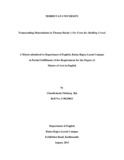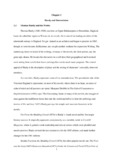Please use this identifier to cite or link to this item:
https://elibrary.tucl.edu.np/handle/123456789/441Full metadata record
| DC Field | Value | Language |
|---|---|---|
| dc.contributor.author | Rai, Chandrakala Thulung | - |
| dc.date.accessioned | 2021-07-01T09:07:07Z | - |
| dc.date.available | 2021-07-01T09:07:07Z | - |
| dc.date.issued | 2011 | - |
| dc.identifier.uri | http://elibrary.tucl.edu.np/handle/123456789/441 | - |
| dc.description.abstract | Thomas Hardy’sFar From the Madding Crowddemonstrates how the major character Bathsheba Everdene transcended the barriers of determinism. In the beginning of the novel Bathsheba is driven by the effect and socio-economic circumstances, and biological drives including heredity. The story of this novel is centred round the love affairs of its three lovers: Gabriel Oak, William Boldwood, and Sergeant Francis Troy-with the single heroine Bathsheba Everdene. In a moment of deterministic dictations and compulsion, she happened to choose a wrong kind of man as her husband. As a result, she was betrayed by sergeant Troy. His act of betrayal forced her to think about making a false choice under the deterministic circumstances. Finally, thedeath of Mr. Troy and lapse of Mr. Boldwood into insanity freed her from deterministic blindness. After going through several ups and downs, ifs and buts she developed sensible and rational mind. In a sense, she castigated in the outset, Bathsheba turns out to be a triumphant heroine who stands above the restriction of determinism. Finally, she acted on free will. She achieved emancipation from the slavery of determinism. | en_US |
| dc.language.iso | en_US | en_US |
| dc.publisher | Department of English | en_US |
| dc.subject | Determinism | en_US |
| dc.subject | socio economics | en_US |
| dc.title | Transcending Determinism in Thomas Hardy's Far from the Madding Crowd | en_US |
| dc.type | Thesis | en_US |
| local.institute.title | Ratna Rajya Laxmi Campus, Pradarshani Marg | en_US |
| local.academic.level | Masters | en_US |
| Appears in Collections: | English | |
Files in This Item:
| File | Description | Size | Format | |
|---|---|---|---|---|
| Cover.pdf | 18.84 kB | Adobe PDF |  View/Open | |
| Chapter.pdf | 151.06 kB | Adobe PDF |  View/Open |
Items in DSpace are protected by copyright, with all rights reserved, unless otherwise indicated.
